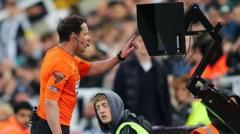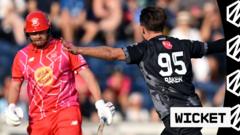Will VAR Soon Decide on Yellow Card Calls?

Referees' Chief Howard Webb on New Premier League Rules
In the evolving landscape of football officiating, the role of the Video Assistant Referee (VAR) has become a topic of heated discussion and scrutiny. Recently, Howard Webb, the chief of referees in the Premier League, shared insights regarding potential expansions in VAR's scope. As the game adapts and seeks to improve its officiating processes, the inclusion of yellow cards and corner awards into VAR's purview may soon be on the table.
Webb has emphasized that the International Football Association Board (IFAB) is currently reviewing the operational framework of VAR, hinting at a readiness to engage in discussions about its broader application. Since its inception in the Premier League during the 2019-20 season, VAR has been limited to intervening in specific, game-altering decisions such as goals, straight red cards, penalties, and cases of mistaken identity.
The Current State of VAR in the Premier League
VAR's implementation has sparked mixed reactions among players, coaches, and fans. While many appreciate its intent to minimize human error, others feel it has complicated the flow of the game. Webb acknowledges this divide, noting that while some believe that VAR should be utilized more broadly, others advocate for a more conservative approach. He remarked, “We try to align VAR delivery with the expectations of those involved in the English game, based on consultation with fans, coaches, and players. The message we get is 'less is more' with VAR.”
This concept of moderation has been a guiding principle for VAR's application thus far. Webb indicates that the past seven years have yielded a relatively stable approach to VAR's operation, and any future changes will require careful consideration of their potential consequences. For instance, introducing VAR for yellow cards could lead to complex situations involving both issued and non-issued cards, affecting the game's dynamics significantly.
Challenges Faced by Referees
Beyond the technicalities of VAR, Webb has expressed concern over the increasing abuse directed at referees at all levels of the sport. Instances of online harassment and threats have escalated, raising alarms about the safety and well-being of officials. He cites high-profile cases where referees have faced serious threats, underscoring a troubling trend in the culture surrounding officiating.
Webb stated, “People have a bigger platform than ever to voice opinions, but some of how that opinion is voiced is unacceptable.” He noted specific cases involving referees like Michael Oliver and Anthony Taylor, who have faced severe backlash and threats following controversial decisions. Webb emphasized that while strong opinions are part of sports, they should not devolve into abusive behavior.
Support Mechanisms for Referees
Recognizing the pressures faced by officials, Webb has highlighted the support systems in place to assist referees. This includes psychological support, mental health resources, and outreach to their families. The aim is to create a more robust support network that addresses the unique challenges referees encounter in their line of work.
As the scrutiny surrounding officiating increases with the advent of VAR, Webb acknowledges that the nature of decision-making has changed. Referees are now subject to intense analysis after decisions are reviewed with multiple angles and additional time. This heightened scrutiny can lead to perceived biases, which Webb describes as “wholly unjustifiable.” He emphasizes that while VAR aims to clarify decisions, it can sometimes complicate the perceptions surrounding those calls.
The Grey Areas of Decision Making
The challenge for Webb and his team is to navigate these grey areas in officiating. While certain calls may seem clear-cut, many decisions remain subjective. For instance, a penalty decision may be viewed as justified by one faction of fans but considered erroneous by another. Webb's insight into this dilemma reveals the complexities involved in refereeing, where consensus is often elusive.
David Coote's Controversy and Its Implications
The topic of referee accountability has been further highlighted by the controversy surrounding David Coote, who faced disciplinary action due to misconduct. Webb acknowledged the difficulties Coote may encounter in returning to officiating at a high level after his dismissal. The situation serves as a reminder of the standards expected from referees and the importance of maintaining professionalism on and off the pitch.
Webb remarked, “Our job was to assess the impact his role as an official had on those choices, given the stress officials face.” This incident has prompted discussions about the support and training provided to referees, aiming to prevent similar occurrences in the future. Webb emphasized that Coote's actions do not reflect the wider officiating culture, and the focus should remain on supporting referees in their roles.
Future of VAR in the Premier League
As the Premier League navigates the future of VAR, Webb's openness to discussions about its expansion indicates a willingness to adapt and evolve. However, any changes will require careful consideration of the potential effects on game flow and the perceptions of fans and players. The balance between utilizing technology to enhance officiating and preserving the spirit of the game is delicate and will require ongoing dialogue among stakeholders.
In summary, the future of officiating in the Premier League is at a crossroads. With the potential for VAR to expand its role and the ongoing challenges faced by referees, the conversation surrounding these issues is more important than ever. As Webb noted, the evolution of football officiating must align with the expectations of those who cherish the game, ensuring that fairness and respect remain at the forefront of the sport.
Frequently Asked Questions
What decisions can VAR currently review in the Premier League?
VAR can currently intervene in decisions related to goals, straight red cards, penalties, and mistaken identity. These are considered match-changing decisions where VAR's input is deemed necessary to ensure accuracy.
How has VAR affected the perception of referees?
The introduction of VAR has increased scrutiny on referees' decision-making, leading to perceptions of bias and conspiracy among fans. The technology allows for more detailed analysis of decisions, but it can also create division in opinions regarding the accuracy of calls.
What measures are in place to support referees facing abuse?
Webb highlighted the importance of psychological support, mental health resources, and outreach to referees' families as part of the support system for officials. This aims to address the unique pressures referees face, especially in light of increased scrutiny and abuse.
Is there a possibility for VAR to review yellow card decisions in the future?
Webb has indicated that discussions are ongoing regarding the potential expansion of VAR to include yellow card decisions. However, any changes would need careful consideration of the implications for the game and its flow.
As the Premier League continues to navigate the complexities of officiating, the balance between technology and the human element remains central to the discourse. What do you think is the best approach to ensure fair officiating in football? #Football #VAR #Refereeing
```Published: 2025-08-13 17:48:05 | Category: sport



